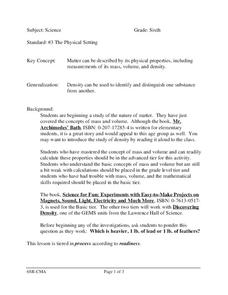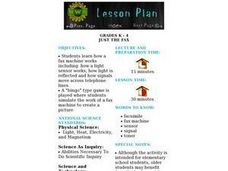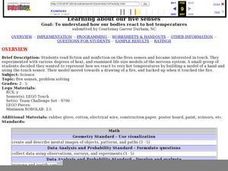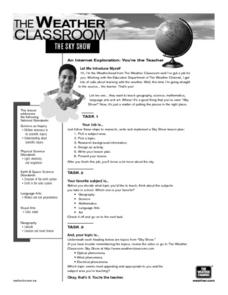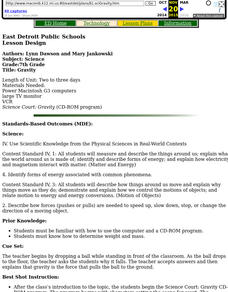Alabama Learning Exchange
This Is How We Roll!
Students research how roller coasters work. In this physics lesson, learners research the history of roller coasters and the safety factors in the design of a roller coaster on the website www.learner.org/exhibits/parkphysics. They...
Curated OER
Plant Cycles
Young scholars identify plants parts and their functions. In this plant cycle lesson, students examine parts of plants and how the parts help them survive in its environment. Young scholars use graphic organizers, the internet, books...
Curated OER
Physical properties of matter
Sixth graders find the physical properties of matter. In this matter lesson, 6th graders measure mass, volume, and density. Students are broken into 3 tiers with 3 different activities based on their understanding of mass and volume.
Curated OER
Vibrant Volcanoes
Students explore volcanoes. In this science lesson plan, students discuss the characteristics of volcanoes and view a video segment about a volcano. Students examine plate tectonics.
Curated OER
Characteristics of Energy
Students explore Earth science by completing energy worksheets in class. In this energy forms lesson plan, students identify and define a list of energy vocabulary terms and a K-W-L chart. Students view a matter video clip in class and...
Pennsylvania Department of Education
Energy in Motion
Fifth graders explore energy transfer. In this thermal energy lesson, 5th graders stretch rubber bands several times and estimate the band's temperature change. Students identify this action as an example of thermal energy. Students...
Curated OER
The History of Life
In this extinction worksheet, high schoolers review how species evolve and how species go extinct. Students compare and contrast gradualism and punctuated equilibrium. This worksheet has 6 fill in the blank and 4 short answer questions.
Curated OER
Simple Circuits
Students investigate how series and parallel circuits work. In this physics lesson, students build their own simple circuits and compare their characteristics. They explain the importance of circuit breakers in household circuits.
Curated OER
Searching For Power
Fourth graders explore different forms of energy and discover ways that natural resources are important. They research how your town would be affected by building your type of power plant.
Curated OER
Do It Yourself: Energy Transfer Lesson Plan
Fifth graders discuss the different types of energy and experiment with tesla coil to show the three types of energy transfer. They write conclusions in their science journal.
Curated OER
Powering a Green Earth
Students compare and contrast renewable and nonrenewable energy. In this environmental science instructional activity, students discuss the importance of going green. They identify the different components in a power grid system.
Curated OER
Which Wrap Is Wrapped Right?
Young scholars investigate the integrity and strength of different types of food wraps. They test the wraps and create a graphic organizer for the data. Once it is organized then a lab report can be written. The lesson plan contains...
Curated OER
Brain Watching
Students identify the different parts of the nervous system. In this biology instructional activity, students research methods to diagnose and cure neurological disorders. They present their report to class.
Curated OER
Just The Fax
Students discover how a fax machine works including: how a light sensor works, how light is reflected and how signals move across telephone lines. A "bingo" type game is played where students simulate the work of a fax machine to create...
Curated OER
Can You See the Music?
Fourth graders examine the makeup of the electromagnetic spectrum and how the various forms of EMRs are similar and different from each other. They, in pairs, solve problems from worksheets imbedded in this lesson plan.
Curated OER
Learning About Our Five Senses
Students study the sense of touch and various degrees of heat. They design a model that displays how the human hand reacts to heat using a touch sensor.
Curated OER
Forces And Energy
Students investigate the atom and how it is formed. They conduct research using a variety of resources and then construct a model of the atom. Then students have class discussion. The instructional activity includes background...
Curated OER
Alternative Energy
Students identify the five major alternative energy sources. In this physical science instructional activity, students assess the advantages and disadvantages for each type of energy. They complete a concept map using information they...
Curated OER
Turbidy and Water
Students use observation skills in assessing the water quality of water samples in this activity and learn that the tastes and preferences of others can be different.
Curated OER
The Sky Show
Young scholars use lecture and research to answer the question: Why is the sky blue? students research a variety of other sky phenomena, chart their observations and participate in experiments.
Curated OER
Gravity
Seventh graders progress through the Science Court: Gravity CD-ROM program. They read about and discuss how gravity was discovered. They complete review worksheets in preparation for the test.
Curated OER
Ourselves
Students use a website to name and compare external body parts of humans and other animals.
Curated OER
Sound and Hearing - Internet Research
Pupils use a website to help them recognize that sound is generated in a variety of ways and from different sources. They determine that sounds vary in tone and loudness, and learn there are different ways to describe sound.
Curated OER
Moving and Growing
Learners know that humans and some other animals have bony skeletons inside their body. They know that other animals have skeletons on the outside of their bodies. They explain the role of both kinds of skeletons.
Other popular searches
- Magnetism and Electricity
- Magnets and Electricity
- Electricity Magnetic Field
- Electricity Magnet Wire Coil
- Magnetism/electricity
- Electricity + Magnetic Field
- Magnetism & Electricity
- Electricity/magnetism Unit




